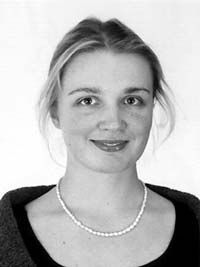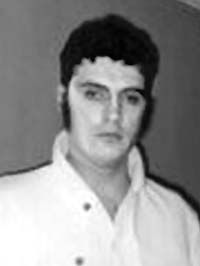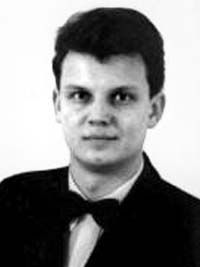Once everybody could recognize voices of their favorite singers literally from the first note. Even the most unsophisticated listeners could tell famous Soviet tenor Sergei Lemeshev from his rival Ivan Kozlovsky. Generations changed, and the symbols of the next epoch became Dmytro Hnatiuk, Anatoly Solovyanenko, and Yevheniya Myroshnychenko. And what about now? We still believe Ukraine to be a land of song. There is no lack of new talents at the National Opera. Every year new probationers who have graduated from conservatories, join the ranks of opera soloists. But are there any truly outstanding personalities among them? One would like to believe so. At least, there are a number of decent singers among those who will represent our art of the opera in the near future. Their journey has just begun.
Olena BIKHUNOVA, mezzo soprano, probationer at the National Opera. Last year’s graduate of Oleksandr Vostriakov’s class, which can rightfully be called a smithy for quality singers. Her debut was in the recent premiere of Prokofiev’s War and Peace. She has already prepared the role of Maddalena in Verdi’s Rigoletto. From Olena’s early days, Il Trovatore was her favorite opera. Now her childhood dreams are coming true: she has prepared the part of Inez from this opera and soon she can start thinking about Azucena. When still in the opera studio, she sang Olga (Eugene Onegin), and Liubasha (The Tsar’s Bride). When I met Olena, she literally astounded me with her light and sensitive view of the world. She adores nature and dreams about doing everything possible to protect it. She has five (count ’em) pets at home. Once, studying Mark Minkov’s vocal cycle to Garcia Lorca’s poetry, she was so interested in the poet’s works that she learned them by heart even in Spanish. In general, she likes to study languages and has a good command of French. Her impeccable breeding and education reminds one of Helene Bezukhov, one of her favorite opera heroines from War and Peace. But in terms of spirit, Sonya from the same opera, whose part she also sang onstage, is closer to Olena. Bikhunova’s biography could provide the plot for a separate story. She worked with an ensemble of old music, playing the organ. She thought about a doctor’s career and studied medicine in Paris. If you want to see a happy person — take a look at Olena Bikhunova. When she came to the War and Peace rehearsals, her eyes radiated joy. Work is a pleasure for her. And fate will inevitably reward the singer for her diligence, clear insight, and harmonic nature.
Hennady VASHCHENKO recently sang Napoleon (War and Peace). In 2001 he graduated from Anatoly Mokrenko’s class at the Academy of Music. Both come from the Sumy oblast. Hennady never fails to stress his tremendous debt to his teacher. Having noticed his pupil’s natural gift, Mokrenko dedicated much effort to make the young baritone acquire the necessary vocal skills and become a fine opera singer. As a student, Vashchenko came to the probation group at the National Opera. Now he is already a soloist. Hennady has a considerable experience in concert performance, since he worked with the Songs and Dance Ensemble of the Internal Affairs Ministry for seven and a half years. Even his military service was connected with music: he served in the Kyiv Military District Ensemble. As it happens, the singer gained his first experience in operatic performance at the National Music Academy’s opera studio. His debut at the National Opera was in Gounod’s Romeo and Juliet. Not long ago conductor Alla Kulbaba suggested that Hennady try himself as Onegin in the opera studio play. The performance was a success, and there are reasons to believe that Hennady will also be able to demonstrate the results of his work on this part onstage at the National Opera. Hennady’s Pantalone in the much talked about Love of Three Oranges is especially popular with the public. There are no bit parts for this singer: he is convinced that both big and small roles must be approached with equal responsibility. This is why even singing the small part of the Company Commander in Onegin, Hennady was a success with the critics.
Oleh SYCHOV, bass, is an alumnus of Viktor Kuryn’s class. Since May 2002 he has been a member of the probationers’ group. He studied in Kharkiv for some time. Now he sings in Kyiv performances with confidence. Everything started with a small part he sang in the Pagliacci. In general, his repertory is quite large. For instance, among the parts he sang at the opera studio are Gremin in Eugene Onegin and Don Basilio in Rossini’s Barber of Seville. In War and Peace he has four roles, Dolokhov been the most remarkable of them. Oleh never speaks much of his plans, but it is easy to figure out that he will continue with the National Opera’s repertory and win the audience’s even greater affection. The stage loves him, and he is able to perform various artistic tasks. In Dolokhov alone he combines high society gloss, rollicking behavior, and boyish flippancy. He successfully performs two more roles in War and Peace in one night: Marshall Bertier and General Yermolov. Last January, he debuted in the role of a completely different character, Maliuta Skuratov in The Tsar’s Bride. The gallery of images he has brought onstage includes, inter alia, the grotesque Cook from The Love of Three Oranges, manly Zuniga in Carmen, and treacherous Sparafucile in Rigoletto.
Dmytro POPOV, tenor, is also a probationer at the National Opera. His first appearance on the Kyiv opera stage was also in War and Peace in three parts simultaneously: as Anatoly Kuragin, Kutuzov’s aide-de-camp, and General Barclay de Tolly. Dmytro came from Kharkiv and now he is in his third year of Oleksandr Vostriakov’s class. He was a soloist at the Kharkiv Opera for some time. On the eve of moving to Kyiv he prepared the part of Alfredo (La Traviata) and sang at rehearsals with an orchestra. Now one can only wish that he were introduced in La Traviata here in Kyiv as soon as possible. It seems that Dmytro is one of those singers who from the very beginning manage without playing supporting roles and master the first-rank repertory. The next work he is ready to sing to Kyiv audiences is Prince Vladimir Igorievich in Prince Igor. Besides, obviously, he will be a perfect Lensky in Eugene Onegin. Dmytro is only 22. Along with other young singers mentioned, this March he went to Switzerland on tour. He dreams of singing all the major roles in the dramatic tenor repertory. Dmytro has performed in government concerts and abroad, plus he has worked with the Armed Forces of Ukraine Ensemble. Last December he sang in Moscow at the closing ceremony of the Days of Ukrainian Culture in Russia. It was there that he appeared onstage together with Oleksandr Hurets, singing Ukrainian folk songs, “O Sole Mio,” and Kalaf’s aria from The Love of Three Oranges. It seemed like a competition with the generally recognized opera master, a contest appearing as captivating for the audience as the famous concerts of the three tenors.










